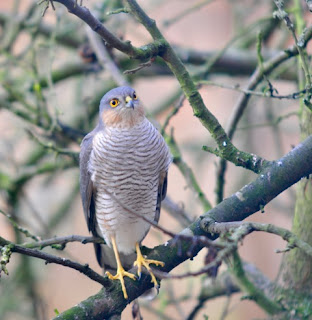Tuesday, 16 February 2016
January Brings the Snow.....
....but it didn't, so shall we get it this month? Here in the East Midlands we have only woken once to a light sprinkling of the white stuff and it did not last long. As I write I am looking at sunshine and frosty ground outside; I have a feeling we have not seen the back of winter yet.
There is a lot of blackthorn in the hedges locally and that is flowering already; birds are pairing up in readiness for breeding. This week, from February 14th - 21st is National Nest Box Week. Modern building methods and a "tidy" countryside have caused a loss of habitat for many species of bird. Consider putting up a nesting box, even if you only have a small garden. There are many different types and sizes available; you will see it being checked out by prospective occupants and in due course can have the pleasure of watching nest-building and subsequent brood-rearing activities.
Heavy rainfall earlier in the month left water standing in fields, making ponds where no ponds should be. Wild ducks were quick to spot them and when I went into the pony paddock I was amused to see five mallard making the most of this new feature.
A recent, and not entirely welcome, visitor to the bird feeders, has been the sparrowhawk He comes at around noon, when the bluetits and other small birds are feeding. Sitting in the damson tree he is well-disguised and can dart out and scoop up any bird who is not aware of his presence. The birds learn quickly, though and find safety amongst the tangle of branches where the sparrowhawk cannot make a quick grab. His strategy has been to dive at them repeatedly until they tire and are then not quick enough to avoid him. It is fascinating to watch and although I would prefer not to see the capture, it is nature at work and not for me to interfere.
The evenings still seem quite long so it was no hardship to attend a meeting of the Women's Institute this month. Jane Streeter, proprietor of The Bookcase, in Lowdham, gave an interesting talk entitled, appropriately, "More Than a Book Shop" From a very small beginning the shop has evolved to develop a wide range of activities, thereby extending it's appeal to a much greater number of local supporters, not simply to readers. The best known is probably the Festival in June but events throughout the year include film shows in the Village Hall (complete with popcorn), First Friday talks in the Methodist Chapel, by writers, collectors and others with special interests. I am looking forward to the first weekend in March when a number of films based on books are to be shown. It will be difficult to chose which ones to see but if you are staying at The Mews there is certain to be something of interest to you - a perfect chance to widen your horizons.
.
Monday, 1 February 2016
Winter
So the winter drags on. Mid-January saw a dramatic fall in temperature and we had our first snowfall. In twenty-four hours it had nearly gone and we waited to see if the old saying that it takes another snowfall to take the first away was fact or fiction. Well, I can report that, in 2016 at least, it was fiction because two days later there was no trace of snow and once again the temperature had risen. As I have said before, in Britain we don't have climate, we have weather.
My small free-range flock of laying hens is wintering well; the rain does not seem to bother them although it makes for unpleasantly muddy conditions underfoot. So far only two are moulting; that is also unusual. It makes them fair game for the others who take every opportunity to peck them - a clear demonstration of the meaning of the phrase "the pecking order".
It will be interesting to see the result of the Farmland Bird Count which is scheduled to take place between February 6th - 14th. With buzzards, foxes and badgers on the increase I expect to see a reduction in the numbers of ground-nesting birds. It is important to leave cover to protect them wherever possible. I find it hard to believe that House Sparrows, are on the endangered list, as there are plenty to be seen here. They live in quite large family groups, are incredibly shy, and fly into the nearest hedge at the slightest disturbance. Another attractive visitor is the Long-Tailed Tit, or rather, Tits, for they also live in families. They are a delight to watch and hear as they fly down onto the bird feeder for a welcome top up.
On the farm we continue the battle against blackgrass. It has appeared in yet another field. Where does it come from? Spraying at the right stage of development and in the right conditions is critical to success in eliminating, or at least reducing it, but so often the weather dictates and we cannot get onto the land without damaging the soil structure. It then becomes necessary to employ a contractor, who will have the best equipment for the job, but this will add to the cost; a difficult decision to make.
Subscribe to:
Comments (Atom)




